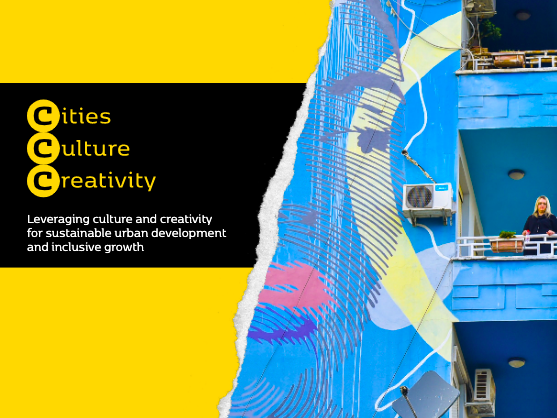![]() UNESCO and the World Bank have partnered for the first time in a joint initiative to enable the cultural and creative industries in cities as part of their recovery and development during and after the COVID-19 pandemic.
UNESCO and the World Bank have partnered for the first time in a joint initiative to enable the cultural and creative industries in cities as part of their recovery and development during and after the COVID-19 pandemic.
In their position paper published on 21 May, UNESCO and the World Bank present the Cities, Culture, and Creativity Framework for action for cities to be more creative by enabling sustainable ecosystems in which cultural and creative industries can attain their full potential to contribute to economic growth, urban vibrancy, social inclusion and innovation.
The creative economy is one of the fastest-growing sectors of the world economy. It generates income, creates jobs and brings in export revenue. Cultural and creative industries contribute annual global revenues of US$2,250 billion and exports of over US$250 billion, and they provide nearly 30 million jobs worldwide and employing more people aged 15−29 than any other sector. At a time when the culture sector has been devastated globally by the COVID-19 crisis, the cultural and creative industries have an untapped potential to help the world’s cities recover and gain resilience.
Cities, Culture, and Creativity draws on global studies and lessons learnt from nine different cities in all regions, from Brazzaville to Madaba to Seoul, which have collaborated with the World Bank and UNESCO, and have harnessed their creativity, achieving positive socio-economic outcomes. It highlights integrated policies and interventions in six areas that can enable the emergence of creative cities: urban infrastructure and livability, skills and innovation, networks and financial support, inclusive institutions and regulations, uniqueness and the digital environment.
Guiding principles and recommendations are provided, offering concrete examples of short and long-term policies, programmes, and investments that cities can put in place to help them recover from the ongoing pandemic and its toll on economies by creating a lasting, enabling environment for the cultural and creative industries to thrive in.
The framework is expected to be implemented through a series of joint UNESCO-World Bank pilot projects in different regions of the world. Cities, Culture, and Creativity is being launched at the 21 May 2021 high-level event on Culture and Sustainable Development organized by the President of the United Nations General Assembly in partnership with UNESCO.
![]() L’UNESCO e la Banca Mondiale hanno collaborato per la prima volta in un’iniziativa congiunta per consentire alle industrie culturali e creative nelle città di avere un ruolo nel loro recupero e sviluppo, durante e dopo la pandemia COVID-19.
L’UNESCO e la Banca Mondiale hanno collaborato per la prima volta in un’iniziativa congiunta per consentire alle industrie culturali e creative nelle città di avere un ruolo nel loro recupero e sviluppo, durante e dopo la pandemia COVID-19.
Nel loro position paper pubblicato il 21 maggio, Cities, Culture, and Creativity Framework for action for the cities >> (In Inglese) , l’UNESCO e la Banca Mondiale hanno individuato ecosistemi sostenibili in cui le industrie culturali e creative possono raggiungere il loro pieno potenziale per contribuire all’economia crescita, vitalità urbana, inclusione sociale e innovazione.
L’economia creativa è uno dei settori in più rapida crescita dell’economia mondiale. Genera reddito, crea posti di lavoro e porta entrate da esportazione. Le industrie culturali e creative contribuiscono con un fatturato globale annuo di 2.250 miliardi di dollari e le esportazioni di oltre 250 miliardi di dollari, forniscono quasi 30 milioni di posti di lavoro in tutto il mondo e danno lavoro a più persone di età compresa tra i 15 ei 29 anni rispetto a qualsiasi altro settore. In un momento in cui il settore della cultura è stato devastato a livello globale dalla crisi del COVID-19, le industrie culturali e creative hanno un potenziale inutilizzato per aiutare le città del mondo a riprendersi e acquisire resilienza.
Città, cultura e creatività attinge a studi globali e lezioni apprese da nove diverse città in tutte le regioni, da Brazzaville a Madaba a Seoul, che hanno collaborato con la Banca mondiale e l’UNESCO, hanno sfruttato la loro creatività, ottenendo risultati socio-economici positivi. Il testo mette in evidenza politiche e interventi integrati in sei aree che possono consentire l’emergere di città creative: infrastrutture urbane e vivibilità, competenze e innovazione, reti e supporto finanziario, istituzioni e normative inclusive, unicità e ambiente digitale. Vengono forniti principi guida e raccomandazioni, offrendo esempi concreti di politiche, programmi e investimenti a breve e lungo termine che le città possono mettere in atto per aiutarle a riprendersi dalla pandemia in corso e dal suo pedaggio sulle economie creando un ambiente durevole e favorevole per il industrie culturali e creative in cui prosperare.
Il quadro dovrebbe essere implementato attraverso una serie di progetti pilota congiunti UNESCO-Banca Mondiale in diverse regioni del mondo. Città, cultura e creatività è stato lanciato all’evento di alto livello del 21 maggio 2021 sulla cultura e lo sviluppo sostenibile organizzato dal presidente dell’Assemblea generale delle Nazioni Unite in collaborazione con l’UNESCO.
Fonte: UNESCO.org

